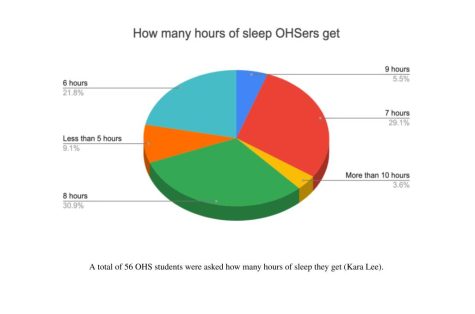Do OHSers Get Enough Sleep?
Results from a survey of 56 OHS students show that 40% of OHSers don’t get enough sleep. These students are getting less than the US Centers for Disease Control and Prevention’s recommendation of eight to ten hours per day for 13 to 18-year-olds.

Ms. Revathi Sundaresan, a math instructor at OHS, teaches classes starting at 6 a.m. Pacific Time. As a result, she’s able to see firsthand the lack of sleep that students get. While she believes that first period classes are great for students on the east coast, she “[sees] a lot of people who are in the West Coast taking this class at six o’clock. Which means they have to wake up at 5:30 [a.m.]. That means they should go to bed at least by ten.” She goes on to say, “I cannot imagine for the life of me that these students are going to be going to bed by nine or ten.”
When asked why students aren’t getting enough sleep, Ms. Sundaresan responds that they are self driven, sometimes at the detriment of their own sleep schedules. “I’ve been doing a little questioning. Not only are they taking most of them five classes, [but] they’re thinking about college college college, and they’re taking sometimes six classes. On top of that, they’re taking classes outside [of OHS] too.” With only 24 hours in a day, students can take on only so many activities before their sleep starts to get affected.”
Mihir Rai, a tenth grade student, comes to the same conclusion. He gets around seven hours of sleep, a number shared by many other OHS students. While he would like more, he says that work prevents him from getting the sleep he needs. Not only does he have schoolwork to do, but his activities include competitive speed cubing, competition math club, debate club, and student government.
Rai says that lack of sleep doesn’t seem to be affecting his productivity. However, sleep deprivation can spiral into bigger problems if not addressed.
Ms. Sundaresan stresses the dangers of not sleeping. “Their immunity goes down. That means they’re going to get sick. When they get sick, anything that can be done in a short period of time like a reading or an assignment is going to take longer for them to finish.” She describes it as creating a “snowball effect.”
An anonymous senior expresses her own experience with lack of sleep. She shares that she has a sleep related medical issue which causes her to lose consciousness without sufficient sleep. Beyond that, she shares the more “normal” effects that she feels. “I’ll feel it the next day… the tired, the reaching for the coffee, the caffeine, stimulants.”
According to the CDC, 72.7% highschool students don’t get enough sleep, a statistic suggesting that a lack of sleep is a widespread problem.
Rai, who has attended high school at both the OHS and a brick and mortar school says that while OHS is more rigorous and difficult, his brick and mortar school makes him do a lot of simple time-consuming work. The homework load averages out to take around the same amount of time.
Steps can be taken for highschoolers get the sleep they need. Rai “gets a headstart on [his] classes during the summer” which makes his academic schedule “a bit more manageable.”
One anonymous senior at OHS gets 12 hours of sleep even while taking five courses and being part of a professional dance company, an anomaly among highschoolers. She accomplishes this by sticking to a strict sleep schedule. Using sleep calculators and alarms, she goes to bed early and wakes up late, always at the same time. There’s another important part of her sleep routine: naps. “[Naps] are very cool to me,” she says.
The senior manages to get all her work done despite allotting a lot of time to sleep by having “productive time.” Additionally, she says that because she is well-rested, “[i]nstead of spending one hour on an RQ, I can get it done in 20 minutes.” In between productive time, she takes breaks of about five to ten minutes.
Teachers are also in a position to help. Ms. Revathi has already taken action. “The first thing that I did was, all the assignments as far as my subject is concerned, it is due by 9 p.m. West Coast time… Previously it used to be midnight, which means the East Coast people are going to be doing it until 3 a.m.,” she says. She also makes sure to give students breaks. During school breaks and Homecoming, she doesn’t make any assignments due so that students can take a deep breath.
Despite her efforts, Ms. Sundaresan admits that she can’t control what happens outside of her own class. She goes on to say, “I think parents have to join the teachers. It has to be universal, and the students, they all have to come together.”
